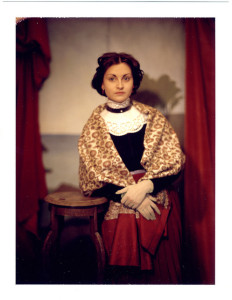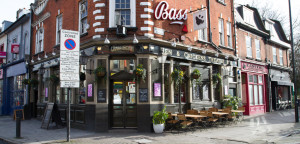Kimberley Andrews continues her quest to bring her own writing to the stage, sharing her top tips along the way. In the second post of the series, she looks at venues: how to find them, what to expect from them and when to run away screaming.
In my case, finding a venue required looking no further than out of my bedroom window. At the time, I lived across the road from the Hen & Chickens Theatre Bar in Islington and almost every night I would hear the lively chatter of a satisfied and slightly tipsy audience leaving the pub after a show. Whenever I found myself in there, which was frequently, given that my flat had a rubbish heating system and was nowhere near as well stocked with wine, it was always jam-packed and the atmosphere welcoming. Like many of the punters, I’d often like the look of whatever show was on that night and on the spur of the moment decide to buy a ticket; usually I’d be disappointed to find that the show was sold out.
Of course, my research wasn’t as lazy as ‘we can see in to each other’s windows and they do a nice Sauvignon Blanc’. On the contrary, because I knew the theatre so well, my investigation was really quite in depth (I practically lived in the place for goodness sake). I knew what kind of work they produced, what the space was like and that the drinks prices wouldn’t force my audience in to drinking tap water. Importantly, I knew that it was near the tube, which left no excuses for those south-of- the-river folks who are inclined to treat a trip to North London like a trip to John O’ Groats (don’t underestimate good transport links, even your best mate is likely feign the death of their dog at the prospect of getting five buses to see your show).

I’m not suggesting that in order to find the right venue you need to live in such close proximity that there’s a good chance they’ll see you putting your PJ’s on at night, I’m just pointing out that it’s worth doing your research in person to make sure a theatre is right for your show. Be prepared to visit several places before you find ‘the one’ but hey, if you’re looking at theatre bars this basically means you can visit pubs and legitimately call it research (hooray). I should probably add here that as an inexperienced producer, my search was confined to smaller fringe venues – I had a hunch that the Globe wouldn’t have a slot for me somehow (sigh)…
Once you’ve loitered in a theatre for long enough to know you like it, you just need to make yourself known to the theatre manager. This can seem daunting to us writers who are used to festering in solitary confinements talking only to our laptops but it really is just a matter of enquiring at the bar or, if you want to be modern about it, getting contact details from the website. Even better if you know someone who works at the theatre who can introduce you and vouch for your greatness.
Once I’d got the details, I sent out a nice, friendly (without being creepy) email, including as much as I could to show that I was capable, prepared and willing to pull out the stops to make the show a success. That said, I’d recommend being concise: they don’t want to read your life memoirs or radical plans for refurbishing the theatre ready for your show. I didn’t send any material at this stage but I did make sure scripts were written and polished, just in case they asked. As a guide, here’s what I included in my email:
- A paragraph about my background and relevant experience.
- A one sentence summary of my show and the length of the run I was hoping for.
- An explanation of why it would be a good fit for their space.
- Details of how amazing and talented the other people involved in the project were (it’s useful at this stage to have a director attached but you wouldn’t be expected to have a cast yet).
- A rough idea of when I wanted my show to take place – this should be at least 3 months in advance for a one-off show and more for a longer run.
Once meetings were in place, I was geeky enough to type up a list of questions to ask them; this comes in useful if, like me, you’re likely to lose your head at the thought of donning some Victorian attire from the props cupboard as soon as you enter the theatre.

10 things to ask the theatre manager
- How much? How much? How much?! What does the venue charge for hire and do they take anything from your box office takings?
- Is any rehearsal space included? I wouldn’t hold your breath for anything more than a couple of hours on performance night, but hey, you can ask…
- Do I need to bring any staff with me, such as a tech or someone to manage the door?
- What’s available in terms of lighting, sound and set? Will I need to pay a technician fee for this support?
- Are there any rules and regulations about the space? (including get-in and get out times
- Is any marketing included? EG, will my show be listed on your website? What marketing will they expect you to do on your own – create Facebook group, provide flyers, etc?
- How many seats are there? And are all of them for sale or are some of them reserved for production/ theatre staff? Always check this as theatres have strict fire regulations and might not be happy about your production team cramming in to a cupboard because you haven’t sorted seats out for them.
- Do they offer any discounts/ help to new writers? EG, could they give you a slot at a reduced rate for a time when they are unlikely to get another booking? Although, please see anecdote below about so-called good deals!
- Is there a space behind the stage for the actors to wait and to put props? Will it be possible to visit with the director to see what this space looks like? This may be particularly important if you’re playing on an off-night of a show that’s already using the space.
- Can I have a contract, please? Ok, so the answer to some of the above questions will be in the contract but always worth double checking that the details match up. Make sure you get any arrangements you’ve agreed in writing.
I learned some valuable lessons from meeting with several theatres: mainly to be wary of so-called ‘good deals’. One theatre, who shall remain nameless, offered me what first appeared to be the best deal ever. They offered hire of their venue for a whole week for no upfront cost. All they asked is that I repaid them from the box office takings. Apparently, they were keen to help out new writers and they had a free week in their calendar that they were unlikely to get a booking for (since most of their shows ran for three weeks or more). I thought all my Christmasses had come at once! A theatre, for a week, for FREE! I was about to give the theatre manager an awkwardly enthusiastic hug when they casually mentioned that they’d also need a cheque from me for the full cost of hire for the week that they would only cash in if I didn’t sell enough tickets. Suddenly, the deal didn’t seem so good after all but at least my urge for hugging an almost total stranger had passed.
Sure, it was helpful of them not ask for money up front and if you can be certain that you’ll sell enough tickets then it’s a win-win, however, I still think it would be wise to have that cheque covered just in case. Personally, if I’d had the money to cover the cheque without missing my rent and going hungry for a month, I’d have just paid for the venue upfront in the first place. And no discount for hiring the theatre during a week that no one else wants….oh thanks. Needless to say, I politely declined the offer, and left the meeting slightly deflated but safe in the knowledge that I hadn’t gambled with money I didn’t have in order to fund my show.
Apart from this random not-so-good deal, I found that most of the venues I met with had similar terms and rates so I decided to go with the Hen & Chickens, after all, it was already my second home…
In the next post, I’ll be looking at how to finance a show without making yourself destitute or tearing your hair out over sums.
Previous post: Part 1: Getting Started


Pingback: How to produce your own work – part 6: Rehearsals | LONDON PLAYWRIGHTS BLOG